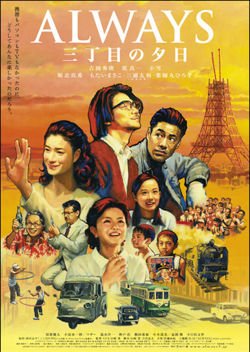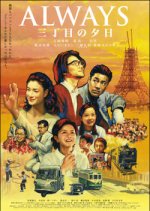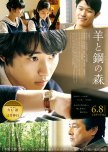In 1958, with the impending completion of Tokyo's TV broadcasting tower as a symbol of Japan's escalating post-war economic recovery, rural schoolgirl Mutsuko arrives from the provinces to begin her first job with Suzuki Auto. Initially impressed by meeting company "president" Norifumi Suzuki, Mutsuko is shocked to discover her workplace is actually a shabby auto repair shop in Tokyo's down-at-heel Yuhi district. Suzuki is a bad-tempered employer but Mutsuko is welcomed by his wife, Tomoe, and their impish 5-year-old son, Ippei. One of Ippei's favorite haunts is a five-and-dime store managed by struggling serial writer Ryunosuke Chagawa. Regarding now-successful writers like Nobel-prize winner Kenzaburo Oe, as overrated, Chagawa wants to be more than a hack churning out sci-fi yarns and selling cheap toys on the side. When alluring newcomer Hiromi opens a sake bar in the area, she gathers clientele quickly -- in dramatically compressed manga style -- but also finds herself lumbered with Junnosuke the orphaned offspring of the bar's previous tenant. Drunk, and smitten by Hiromi, Chogawa accepts custodianship of the boy. Edit Translation
- English
- magyar / magyar nyelv
- dansk
- Norsk
- Native Title: オールウェイズ 三丁目の夕
- Also Known As: Always san-chome no yuhi , Always - Sunset on Third Street , ALWAYS 三丁目の夕日
- Screenwriter: Kosawa Ryota
- Screenwriter & Director: Yamazaki Takashi
- Genres: Comedy, Life, Drama, Family
Cast & Credits
- Yoshioka HidetakaChagawa RyunosukeMain Role
- Tsutsumi ShinichiSuzuki NorifumiMain Role
- KoyukiIshizaki HiromiSupport Role
- Horikita MakiHoshino Mutsuko / "Roku"Support Role
- Yakushimaru HirokoSuzuki TomoeSupport Role
- Koshimizu KazukiSuzuki IppeiSupport Role
Reviews

The best scene with Tv and fridge...! totaly amazing! xD

Lavishly heartwarming
Takashi Yamazaki's lavish screen adaptation of Ryōhei Saigan's immensely popular manga, Always Sunset on Third Street is unashamedly sentimental, a glossy, big-budgeted soap opera remaining captivating in its swoon of admiration for the period it is portraying. It's not intended as a serious examination of the tribulations faced by post-war Japan, though hints are thrown in now and again, instead, it focuses on the daily lives of its larger-than-life characters. Although it sometimes feels episodic, the cornerstone of this movie's success lies in its charming essence, lovable performances and overall warmth, sweeping the viewer along with its energy, tugging at the heartstrings every step of the way.















































